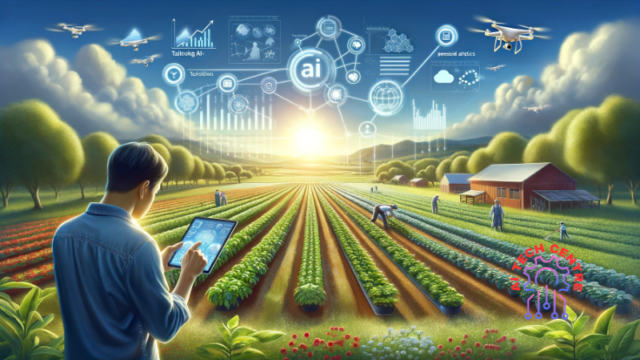Introduction to Harvesting Technology
In the ever-evolving world of agriculture, technology plays a vital role in optimizing efficiency, increasing productivity, and ensuring sustainable practices. One area where significant advancements have been made is in harvesting technology. Harvesting technology utilizes artificial intelligence (AI) to revolutionize small-scale and specialty agriculture, transforming the way crops are grown and harvested.
The importance of technology in agriculture
As the global population continues to grow and resources become more limited, the need to produce food more efficiently and sustainably becomes paramount. Technology in agriculture allows farmers to meet these challenges by automating processes, monitoring crop health, optimizing resource usage, and improving overall productivity. By harnessing the power of technology, farmers can maximize yields while reducing environmental impact, ensuring a secure food supply for future generations.
Overview of AI in small-scale and specialty agriculture
AI has the potential to revolutionize small-scale and specialty agriculture by providing innovative solutions tailored to the unique challenges faced by farmers in these sectors. AI-powered tools can analyze data from sensors, drones, and satellite imagery to provide real-time insights into crop health, water usage, soil conditions, and pest management. This enables farmers to make data-driven decisions, optimize irrigation schedules, apply precise amounts of fertilizers and pesticides, and mitigate crop diseases effectively.
Furthermore, AI algorithms can automate harvesting processes, such as fruit and vegetable picking, which have traditionally relied on labour-intensive manual labour. This not only increases efficiency but also reduces labour costs and reliance on seasonal workers. When AI in small-scale agriculture is harnessed, farmers can achieve higher yields, minimize waste, and maintain profitability in a highly.
AI Applications in Small-Scale and Specialty Agriculture
Enhancing Crop Yield and Quality
AI-powered tools have the potential to significantly improve crop yield and quality in small-scale and specialty agriculture. By analyzing data collected from sensors, drones, and satellite imagery, farmers can gain valuable insights into crop health, enabling them to make informed decisions and take proactive measures to protect their crops.
For example, AI algorithms can detect early signs of diseases or pests that may threaten the crops. By identifying these issues early on, farmers can take preventive measures, such as applying targeted treatments or adjusting irrigation schedules, to minimize crop loss. This not only improves the overall yield but also ensures that the harvested crops meet the quality standards expected in the market.
Improving Resource Management
In small-scale and specialty agriculture, efficient resource management is vital to maximize productivity and reduce waste. AI technology can play a crucial role in optimizing resource usage, such as water, fertilizers, and pesticides.
By analyzing data on soil conditions, weather patterns, and crop requirements, AI algorithms can accurately determine the optimal amount and timing of resource application. This ensures that resources are utilized effectively, minimizing waste and environmental impact.
Moreover, AI-powered systems can provide real-time monitoring and automation of irrigation processes. By precisely controlling water delivery based on crop needs, farmers can avoid over-irrigation, which can lead to water wastage and nutrient leaching, while ensuring that the crops receive adequate hydration for optimal growth.
AI applications in small-scale and specialty agriculture offer promising solutions to enhance crop yield, improve resource management, and ultimately revolutionize the industry. By harnessing the power of AI, farmers can achieve higher productivity, reduce costs, and contribute to sustainable agricultural practices. With further advancements in AI technology, the future of small-scale and specialty agriculture looks promising, promising increased efficiency and profitability for.
Customizing AI for Small-Scale and Specialty Agriculture
Challenges in tailoring AI for unique agricultural settings
Adapting AI technology to meet the specific needs of small-scale and specialty agriculture poses several challenges. One of the main difficulties lies in the diverse and unique characteristics of each agricultural setting. Unlike large-scale farming, small-scale and specialty agriculture often involve niche crops, limited resources, and localized production systems. This requires AI systems to be customized to handle the variability and specific requirements of these settings.
Another challenge is the availability and accessibility of data. AI algorithms rely heavily on data to generate accurate insights and predictions. However, small-scale and specialty farmers may have limited access to data sources such as sensors, drones, and satellite imagery. Integrating AI with existing data collection systems or developing cost-effective alternatives becomes crucial to ensure the success and scalability of AI technology in these agricultural contexts.
Promising approaches and solutions
To overcome these challenges, researchers and developers are exploring innovative approaches to customize AI for small-scale and specialty agriculture. One approach is the development of AI models trained on relevant localized data. By collecting data specific to the crop, climate, and soil conditions of a particular agricultural setting, AI algorithms can be fine-tuned to provide more accurate insights and predictions.
Another solution is the use of edge computing. Edge computing involves processing data at the edge, closer to the source, rather than relying on centralized cloud infrastructure. This approach reduces latency and allows for real-time analysis, making AI more adaptable to the dynamic nature of small-scale and specialty agriculture.
Furthermore, collaborations between agricultural experts and AI developers are crucial in designing and implementing AI systems tailored to the specific needs of farmers. By understanding the challenges and requirements unique to small-scale and specialty agriculture, AI can be customized to provide practical and effective solutions.
Customizing AI for small-scale and specialty agriculture requires addressing the challenges posed by the diverse agricultural settings and limited data availability. However, promising approaches such as localized data training and edge computing offer potential solutions. With continuous research and collabouration, customized AI has the potential to revolutionize small-scale and specialty agriculture, improving productivity, sustainability, and profitability for farmers in these sectors.

Case Studies
AI-driven solutions in small-scale vegetable farming
One compelling case study showcasing the potential of AI in small-scale vegetable farming comes from a farm in California. The farm implemented an AI-powered system that utilizes sensors to monitor soil moisture, temperature, and other environmental factors. This data is then processed by AI algorithms to provide real-time insights and recommendations for irrigation, fertilization, and pest control. By automating these processes, the farm was able to significantly improve crop yield and quality while reducing water and chemical usage.
Another case study highlights the use of AI in small-scale organic farming. A farm in the Pacific Northwest utilized AI-powered drones equipped with cameras and sensors to monitor crop health and detect early signs of disease or pests. The drones collected data, which was then analyzed by AI algorithms to identify potential issues and provide targeted recommendations for treatment. This proactive approach allowed the farm to prevent crop loss and minimize the need for chemical interventions, aligning with their sustainable farming practices.
AI applications in specialty crop production
An interesting case study demonstrates the use of AI in specialty crop production, specifically in the wine industry. A vineyard in France implemented an AI system that analyzed weather data, soil conditions, and historical grape quality data to optimize irrigation, pruning, and harvesting schedules. The AI algorithms were able to predict the optimal time for harvesting based on grape ripeness and vineyard conditions. This enabled the vineyard to consistently produce high-quality grapes, resulting in award-winning wines and increased customer satisfaction.
In another example, a coffee farm in Ethiopia utilized AI to enhance the processing of specialty coffee beans. By analyzing data on humidity, temperature, and specific bean characteristics, AI algorithms optimized the roasting and blending process. This resulted in a superior flavor profile and more consistent quality for the specialty coffee, leading to higher demand and premium prices in the market.
These case studies demonstrate the transformative potential of AI in small-scale and specialty agriculture. By customizing AI technologies to meet the unique needs of each agricultural setting, farmers can achieve improved productivity, sustainability, and profitability, revolutionizing their businesses in the process
Benefits of AI in Small-Scale and Specialty Agriculture
Increased efficiency and productivity
AI technology has the potential to revolutionize small-scale and specialty agriculture by significantly increasing efficiency and productivity. With AI-powered systems in place, farmers can gather real-time data on various aspects of their operations, such as soil moisture, weather conditions, and crop health. By analyzing this data, AI algorithms can provide valuable insights and recommendations for optimized irrigation, fertilization, pest control, and harvesting schedules.
By leveraging AI, farmers can make data-driven decisions that lead to improved crop yields, higher quality produce, and reduced wastage. For example, AI-powered systems can precisely monitor and regulate irrigation, ensuring that crops receive the right amount of water at the right time. This not only saves water but also minimizes the risk of water stress or overwatering.
Reduced labour and resource costs
AI technology can also help farmers in small-scale and specialty agriculture reduce labour and resource costs. Traditionally, these types of farming require a significant amount of manual labour and resources to monitor and manage operations. However, with AI-driven solutions, many tasks can be automated, reducing the need for extensive human intervention.
For instance, AI-powered drones equipped with cameras and sensors can monitor crop health, detect diseases or pests, and provide necessary interventions. This eliminates the need for manual scouting and reduces the reliance on chemical interventions. Furthermore, AI systems can optimize resource usage by precisely determining the required amount of fertilizers, pesticides, and water, minimizing waste and unnecessary expenses.
In addition to labour and resource cost savings, AI technology also enables farmers to streamline their operations and allocate resources more effectively. By automating repetitive and time-consuming tasks, farmers can focus on more strategic activities such as marketing, customer relationship management, and overall business growth.
By embracing AI in small-scale and specialty agriculture, farmers can experience increased efficiency, productivity, and profitability while also promoting sustainability and reducing environmental impact. This technology holds immense potential in transforming the agriculture industry and shaping.
Limitations and Considerations
Implementing AI technology in small-scale and specialty agriculture brings forth both opportunities and challenges. It is important to consider the potential limitations and ethical considerations associated with the adoption of AI in this industry.
Potential limitations and challenges of AI adoption
While AI has the potential to revolutionize small-scale and specialty agriculture, there are limitations and challenges that need to be addressed:
- Cost: The initial investment in AI technology can be expensive for small-scale farmers. The cost of acquiring AI-powered equipment, software, and training personnel can be prohibitive, making it difficult for them to adopt this technology.
- Data availability and accuracy: AI algorithms require large amounts of accurate data to produce reliable insights and recommendations. However, data collection and management can pose challenges for small-scale and specialty farmers who may not have access to advanced sensors or the necessary infrastructure to collect and analyze data effectively.
- Technological literacy: Some farmers may lack the necessary technical skills to understand and fully utilize AI technology. This can hinder their ability to effectively implement and leverage AI solutions in their farming operations.
Ethical considerations in AI-powered agriculture
As AI becomes more prevalent in agriculture, ethical considerations must be taken into account:
- Privacy: The collection and use of data in AI-powered agriculture raise concerns about data privacy and ownership. Farmers need reassurance that their data will be handled securely and won’t be shared without their consent.
- Job displacement: Automation through AI technology may lead to job losses in the agricultural sector. It is important to consider the impact on rural communities and develop strategies to mitigate adverse effects.
- Algorithmic bias: AI algorithms are only as good as the data they are trained on. Bias in training data can lead to biased or unfair outcomes, such as discrimination in hiring or resource allocation. It is crucial to ensure that AI systems are trained on diverse and representative data to avoid reinforcing systemic biases.
While AI holds great promise for small-scale and specialty agriculture, it is important to address the limitations and ethical considerations associated with its adoption. By doing so, stakeholders can ensure that AI-powered solutions contribute positively to the industry’s growth, sustainability, and ethical practices.
The Future of Harvesting Technology
Emerging trends and advancements
As the agricultural industry continues to evolve, there is a growing interest in the development of harvesting technology powered by artificial intelligence (AI). AI is poised to revolutionize small-scale and specialty agriculture by providing innovative solutions to various challenges.
One such emerging trend is the use of machine learning algorithms to optimize harvest timing and yield. By analyzing data from sensors placed on crops, AI can accurately determine the optimal time for harvesting, ensuring maximum yield and quality. This not only reduces waste but also improves overall efficiency and profitability for farmers.
Another advancement in harvesting technology is the use of AI-enabled robotic systems. These robots are equipped with advanced computer vision and machine learning algorithms that allow them to identify and selectively harvest ripe crops. This improves precision and reduces labour costs, as robots can work tirelessly without fatigue.
Opportunities and potential impact on farming practices
The adoption of AI-powered harvesting technology presents several opportunities for small-scale and specialty farmers. Firstly, it allows for more efficient resource management. AI can analyze data on soil quality, weather patterns, and crop health to optimize irrigation and fertilizer use, reducing waste and environmental impact.
Furthermore, AI-powered harvesting technology enables data-driven decision-making. Farmers can access real-time information on crop conditions, market demand, and pricing, allowing them to make more informed choices and maximize profits.
The potential impact of AI on farming practices goes beyond efficiency and profitability. It also holds promise for sustainable agriculture. By reducing water and chemical usage, optimizing resource allocation, and minimizing waste, AI can contribute to the development of environmentally friendly farming practices.
The future of harvesting technology lies in the integration of AI. Small-scale and specialty farmers can leverage AI-powered solutions to improve efficiency, reduce labour costs, and make more informed decisions. This technology not only enhances productivity but also promotes sustainability in agricultural practices. As AI continues to advance, the possibilities for revolutionizing the harvesting
Conclusion
Summary of the benefits and potential of AI in small-scale and specialty agriculture
The integration of artificial intelligence (AI) in harvesting technology offers numerous benefits and potential for small-scale and specialty agriculture. By utilizing machine learning algorithms and AI-enabled robotic systems, farmers can optimize their harvest timing and yield, leading to reduced waste and improved efficiency and profitability. AI also allows for more efficient resource management by analyzing data on soil quality, weather patterns, and crop health, which helps in optimizing irrigation and fertilizer use. Additionally, AI-powered solutions provide real-time information on crop conditions, market demand, and pricing, enabling farmers to make more informed decisions and maximize their profits.
Looking ahead to a more sustainable and efficient future
The potential impact of AI on farming practices extends beyond productivity and profitability. AI-powered harvesting technology holds promise for sustainable agriculture by reducing water and chemical usage, optimizing resource allocation, and minimizing waste. This promotes environmentally friendly farming practices and contributes to the overall development of a more sustainable and efficient agricultural industry. As AI technology continues to advance, there are endless possibilities for revolutionizing the harvesting process and driving positive change in the agricultural sector.
In conclusion, the integration of AI in small-scale and specialty agriculture provides numerous advantages, including improved efficiency, reduced labour costs, and informed decision-making. As the industry looks towards a more sustainable future, AI-powered harvesting technology plays a crucial role in optimizing resource management and promoting environmentally friendly practices. By embracing AI solutions, farmers can harness the full potential of technology to revolutionize their operations and contribute to a more efficient and sustainable.










